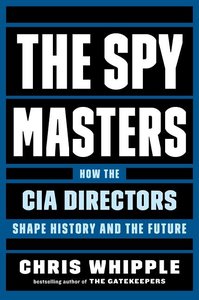
By Eugene Surowitz
On page 319 of his book “Spymasters”, Chris Whipple cites an unnamed former senior CIA official as characterizing Gina Haspel by saying that “She would make a great prison camp commandant.”
Her various forms of objectionable behavior include: heading a rendition camp, testifying to Congress in private rather than during a showboat, and applauding during a Trump speech. These are also known as classic functions of intelligence agency heads: keeping silent in public, running the black operations of their agency, and supervising the gathering of intelligence.
Three pillars of responsibility have been in the CIA’s historical remit: gathering readily available data and its analysis; sneak thieving data and intentions from foes (and ‘friends’); and dirty tricks of various magnitudes and degrees of effectiveness. The last, in particular, tends to result in noisy Congressional hearings.
Whipple’s spymasters are the CIA heads rather than the other heads of the collectivity of agencies under the Director of National Intelligence, who is tasked with getting all our agencies to talk to each other after 9/11. It’s a long way from the time since Herbert O. Yardley got his walking papers from Henry L. Stimson with “Gentlemen do not read each other’s mail!” Yardley published “The American Black Chamber” which sent the Japanese military ballistic (as well our own). Efforts to reconstruct offices capable of dealing with other countries concealment were sufficiently successful to get us through the second World War. The Cold War was too big and complex to yield to ad hoc organizations and it led to the bureaucratic security hydra that now exists as the “United States Intelligence Community”.
Whipple focuses on the CIA Directors and their conflicted relations with their President; the rate of turnover in both posts is roughly equal. There is an old truism about leaders and their spies: they get the intelligence products they want! The clashes come when unable to take credit for a perspicuous success, the President blames a failure of intelligence; Congress enjoys taking part in this blame game too.
The first non-fiction book I recall reading along the lines of spies and their activities is Ladislas Farago’s “War of Wits” (1954), later reissued in “Spymaster”. Possibly used as a textbook by some agencies at one point, this introduced the basic definitions and their practical application of the worlds of espionage, intelligence, and counters to those.
I am also reminded of “The Craft of Intelligence” which Allen Dulles published in 1965 of his experiences as the CIA Director at the peak of the Cold War before it became a numbing nightmare continuity. After a a group of start-up directors, he settled in to give us such triumphs of the craft as the 1953 Iran coup that aroused anger that the present Iranian regime feeds on and later the shambolic Bay of Pigs invasion and our ransoming the invaders.
The latter gave him a deserved dismissal. After an interim period, Whipple’s first focus is Richard Helms and proceeds stolidly through his mastery of the spies and those of his successors. There is a one-sided aspect of any such account in that the spymasters retain their official reticence while verbal trumpeting from the White House and the Capital dunce caps is always available. The usual situation does not pertain wherein past masters can begin blabbing to their interrogators to the extent that they can be convinced that those already have a good piece of the story. That clam opener helped open the Ultra and Magic secrets decades after the facts. When the masters are not resting in peace, they are still too close to the current action.
In short, Whipple has given us a very readable volume summarizing the squabbles of the top rank of the CIA with would be masters of a universe that obstinately refuses to obey their whims. Sorry, but no ripening dead bodies.
Editors Note: Chris Whipple is a GCDS Alumnus, notable documentary filmmaker, and New York Times bestselling author. Recently Whipple ’68, joined the GCDS Grade 10 American Studies classes to discuss his new book and his path as a journalist, writer, and producer.




